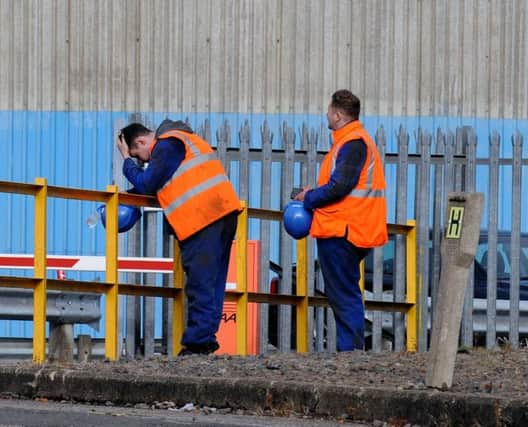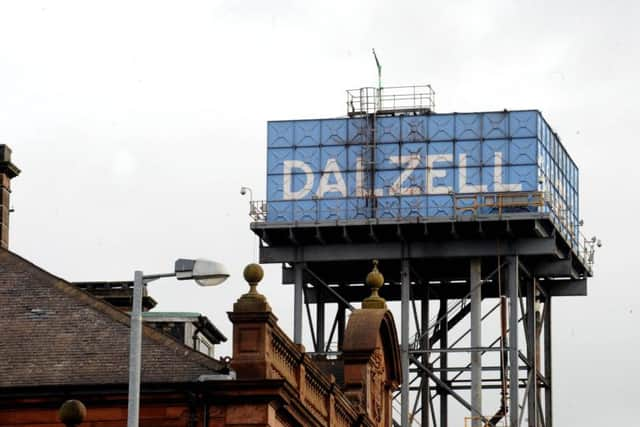Uphill struggle to rescue steel jobs, admits Ewing


Business minister Fergus Ewing said the group will “fight in every way we can” to rescue the Tata Steel mills in Motherwell and Cambuslang, but admitted it “won’t be easy” after the company confirmed the plants would be mothballed with the loss of 270 jobs. The move was described as a final blow to the heavy steel industry in Scotland, which has a heritage stretching back 150 years. Tata said last night that UK manufacturing is now in “crisis”.
Union leaders insisted there is a future for the plants but said the Scottish Government must do more to make lucrative public sector work on projects, including new roads and flood defences, available to a new operator. Workers at the Lanarkshire plants said they were “devastated” by yesterday’s confirmation, which came after a weekend of fevered speculation. The Indian firm is shedding 1,200 UK jobs as the crisis engulfing the country’s steel industry intensifies.
Advertisement
Hide AdAdvertisement
Hide AdThe firm has blamed a shift in market conditions caused by a “flood of cheap imports” – particularly from China – a strong pound and high electricity costs.


Mr Ewing was appointed at the weekend to head up a task force involving the firm and union representatives.
“Our primary objective is to find a commercial operator to carry on the steel industry in Scotland,” Mr Ewing said.
“Now that won’t be easy but that’s an objective to which we apply ourselves.”
First Minister Nicola Sturgeon will visit the plants tomorrow to meet workers and management. She said: “This is a very anxious time for employees and their families and is deeply concerning for everyone involved. My government is determined to fight for a future for our steel industry. We will leave no stone unturned in our efforts to keep the plants open.”
John Park, assistant general secretary of the Community union, said the plants can still have a future, but ministers must adopt a more active “industrial strategy” to help ensure they can secure work.
“You could then make investment in the plant if necessary, you could then make sure the skills are right, but it’s where that investment comes from.
“I would hope that if someone does come in, then the Scottish Government will look at what they can do within the investment they can provide, the support they can provide. But it’s more than that – it’s more about opportunities to engage with the Scottish Government on public sector infrastructure projects.”
Advertisement
Hide AdAdvertisement
Hide AdThe Scottish Government has come under fire for using imported Chinese steel to build the new Forth road bridge.
Ross Clark, Community’s lead representative at the Tata Steel plant in Dalzell, said: “Everybody’s devastated and worried by today’s news. We’ve faced a lot of challenges in this business and we’ve overcome them, but now our future is uncertain. We welcome the fact the Scottish Government is going to set up a task force and Community will play a full role in that.
“The task force must deliver on the promises the Scottish Government has made in recent days to save our steel.”
The plate mills in Scunthorpe, Dalzell (Motherwell) and Clydebridge (Cambuslang) are to be mothballed by Tata for 45 days, while one of the two coke ovens at the Scunthorpe steelworks will be closed.
The move sounds the death knell for heavy steel production in Scotland. The only steel plant left is the former Clydesdale tubeworks in Bellshill, now owned by Vallourec, supplying components for the North Sea.
About 5,200 jobs have been lost in the UK steel industry in a fortnight after the closure of SSI in Redcar and Caparo’s announcement yesterday that about 1,800 jobs would be lost.
Karl Koehler, chief executive of Tata Steel’s European operations, said: “I realise how distressing this news will be for all those affected. We have looked at all other options before proposing these changes.
“We will work closely with employees and their trade union representatives. We will look to redeploy employees, wherever possible, and minimise employee hardship.The UK steel industry is struggling for survival in the face of extremely challenging market conditions.
Advertisement
Hide AdAdvertisement
Hide Ad“This industry has a crucial role to play in rebalancing the UK economy, but we need a fairer system to encourage growth. The European Commission needs to do much more to deal with unfairly traded imports – inaction threatens the future of the entire European steel industry.”
David Cameron has pledged to raise cheap imports with Chinese President Xi Jinping on his state visit to the UK this week.
Speaking at a street stall campaign to save steel jobs in Motherwell, Scottish Labour leader Kezia Dugdale said: “The Scottish Government must immediately offer support to those who will soon be out of a job.
“The steel industry is iconic in this part of the world. It has not only sustained jobs and boosted the local economy, it’s part of Lanarkshire’s DNA. We cannot let the light go out on the industry without a fight.”
Unite Scottish secretary Pat Rafferty said: “Today’s news effectively brings an end to a proud tradition of steelmaking in Scotland,”
Mr Rafferty added. “The impact on the Scottish economy, which is also being hammered by job losses in North Sea oil, will be severe unless there is urgent support. We will be pressing the Scottish Government. The UK Government should take note of the Scottish Government’s more proactive response and act to save our steel across the UK.”
Gareth Stace, director of trade body UK Steel, demanded UK Government action on energy costs, business rates and unfair trade. He added: “We must also see a commitment from all parts of government at the highest level to ensure the sector’s survival in the UK. The Prime Minister can demonstrate he is prepared to lead this commitment by stepping in this week and pressing the Chinese premier about the dumping of under-priced steel, one of the major factors killing our industry.”